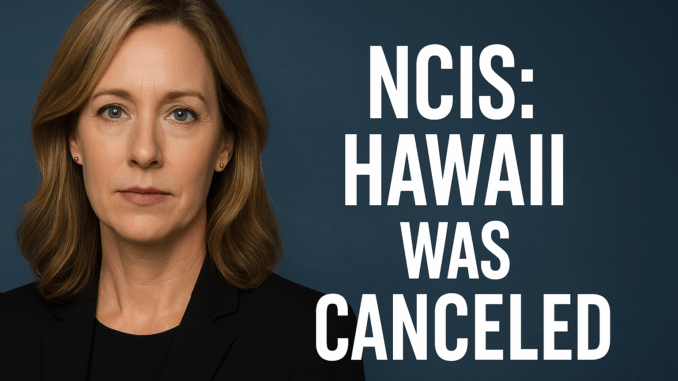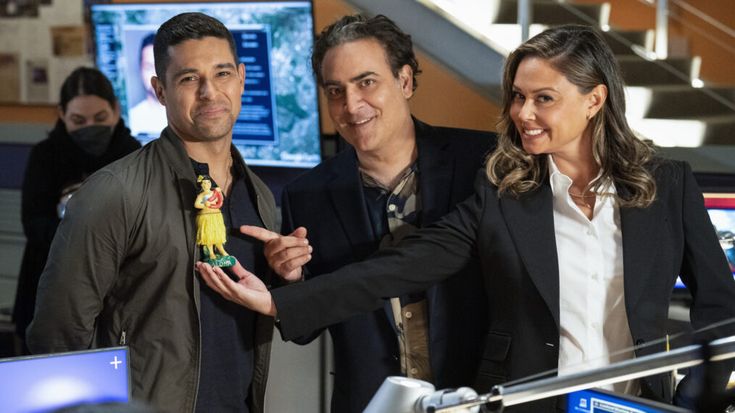
When CBS confirmed the cancellation of NCIS: Hawaii, fans were left stunned, confused, and—let’s be honest—a little angry. The show had a loyal following, a refreshing setting, and a strong cast led by Vanessa Lachey. So why on earth would CBS pull the plug on a hit series? According to CBS Entertainment President Amy Reisenbach, the decision wasn’t as simple as ratings. Let’s dive deep into the real reasons NCIS: Hawaii was canceled and what it means for the future of the NCIS universe.
The Shocking Announcement That Rocked Fans
The cancellation news landed like a thunderstorm in paradise. Fans who tuned in weekly to watch Jane Tennant and her team solving crimes in sunny Hawaii couldn’t believe the series was ending after just three seasons. Social media lit up with hashtags like #SaveNCISHawaii and #BringBackJaneTennant, proving just how passionate the fanbase had become.
Amy Reisenbach’s Official Statement
CBS Entertainment President Amy Reisenbach explained that the decision came after a “careful evaluation” of the network’s programming slate. While she praised the cast, crew, and creative direction, she admitted that factors such as cost, scheduling, and broader network strategy played critical roles in the show’s fate.
Reason 1: High Production Costs
Let’s be real—filming in Hawaii isn’t cheap. From travel expenses and housing for cast members to the cost of on-location shoots, NCIS: Hawaii had one of the highest production budgets of any CBS drama. As networks tighten budgets in the streaming era, cost-cutting often outweighs fan loyalty.
Reason 2: Shifting Network Strategy
CBS is recalibrating its lineup to adapt to changing viewer habits. With streaming platforms competing fiercely for attention, traditional networks have to make tough choices. Reisenbach hinted that CBS wanted to free up resources for new projects that could appeal to both linear TV audiences and Paramount+ subscribers.
Reason 3: Ratings Plateau
While NCIS: Hawaii had a steady audience, it wasn’t breaking records. Ratings were solid but not spectacular. In today’s TV landscape, “good” isn’t always good enough. Networks prioritize shows that dominate their timeslot or deliver significant streaming traction—two areas where the spin-off struggled to outperform.
Reason 4: Franchise Fatigue
Let’s face it—the NCIS franchise has been around for decades. With NCIS, NCIS: Los Angeles, and now NCIS: Sydney, some executives feared oversaturation. Reisenbach noted that CBS didn’t want to “dilute the brand,” suggesting that keeping too many spin-offs alive at once could hurt the flagship series.
Reason 5: Focus on New Content
CBS isn’t abandoning the franchise entirely. In fact, the network recently greenlit NCIS: Origins, a prequel following a young Leroy Jethro Gibbs. By shifting resources from Hawaii to this new project, CBS hopes to re-energize the fanbase with fresh storytelling while still honoring the brand’s legacy.
Fan Reactions – A Wave of Disappointment
Fans weren’t shy about voicing their anger. Twitter and Reddit filled with posts slamming CBS for canceling a show that brought diversity, strong female leads, and cultural representation to the franchise. Some even launched online petitions to revive the series on another network or streaming service.
Cast and Crew Speak Out
Vanessa Lachey, who made history as the first female lead in an NCIS series, posted an emotional message thanking fans for their support. Other cast members echoed her sentiment, calling the cancellation “bittersweet” and expressing gratitude for the chance to showcase Hawaii’s beauty and culture.
Could NCIS: Hawaii Find a New Home?
In the streaming era, cancellations don’t always mean the end. Shows like Lucifer and Brooklyn Nine-Nine found second lives on new platforms. While Reisenbach didn’t confirm any talks, fans speculate that Paramount+ could revive the show if the demand is strong enough.
The Legacy of NCIS: Hawaii
Even though its run was cut short, NCIS: Hawaii left a mark. It introduced fresh characters, brought representation to the forefront, and reminded viewers that crime-solving doesn’t always happen in dark alleys—it can happen on sun-soaked beaches too.
How CBS Plans to Move Forward
CBS wants to keep the NCIS universe alive but in a “strategic way.” That means fewer spin-offs running simultaneously and a greater focus on shows that deliver big returns. With NCIS: Origins on the horizon, fans can expect the network to lean into nostalgia while keeping things fresh.
The Business Behind the Decision
At the end of the day, canceling NCIS: Hawaii wasn’t just about the show—it was about dollars and strategy. Networks are businesses, and tough calls are part of the game. As Reisenbach put it, “We love the show, but we have to look at the bigger picture.”

Lessons from the Cancellation
For fans, the cancellation is a painful reminder that even beloved shows aren’t immune to network shakeups. For CBS, it’s a move to balance fan loyalty with financial reality. And for the industry, it shows how TV is evolving in the age of streaming wars.
What’s Next for Fans of the NCIS Franchise
If you’re mourning the end of NCIS: Hawaii, don’t lose hope. The NCIS universe is far from over. Between the flagship series, international spin-offs, and upcoming prequels, there’s still plenty of crime-solving action on the horizon.
Conclusion
The cancellation of NCIS: Hawaii may feel like a gut punch to fans, but Amy Reisenbach’s explanation sheds light on the difficult balance networks must strike. High costs, shifting strategies, and ratings realities all played a part in ending the tropical spin-off. Still, the spirit of NCIS lives on in new projects—and who knows? Maybe the islands will call the team back someday.